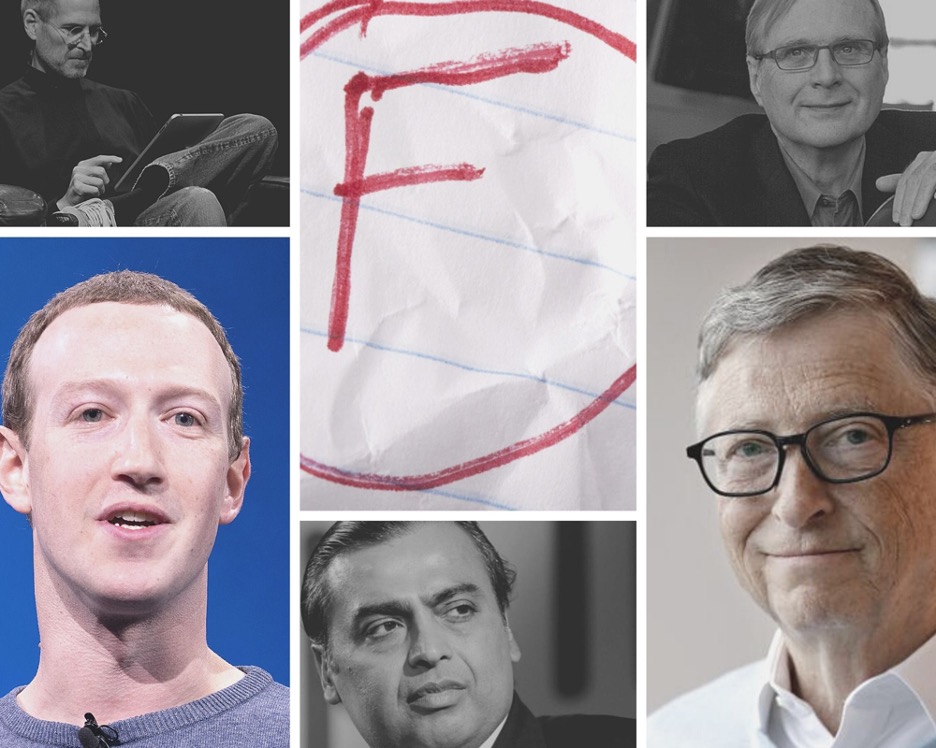
Quick question – What will happen if you get less than 95% in your board exams?
Real quick answer – NOTHING.
Rabindranath Tagore attended college for only one day and left law school after a few months. Bill Gates decided to withdraw from Harvard to set up Microsoft in 1975. Steve Jobs quit Reed College after just one semester. Mark Zuckerberg dropped out of school in 2005 to work on thefacebook.com. Jack Dorsey dropped out of NYU in 1999, founded Twitter in 2006. Sachin Tendulkar dropped out of school to pursue cricket and is now ‘God of Cricket.’ Jan Koum dropped out of San Jose State University to work for Yahoo and then founded WhatsApp. Daniel Ek lasted only 8 weeks at college before founding Spotify. David Karp left high school at 14, launched Tumblr in 2007. Ritesh Agarwal, the founder of OYO Rooms, dropped out of college to sell sims, became the world’s second-youngest billionaire in 2020. Mukesh Ambani cut short his Ivy League education to join his family in running Reliance.
These are just a few of the many successful innovators who once decided they were better off without a formal education. Surprisingly, it ended pretty well for them.
Education is arguably a crucial part of one’s life and journey to success from the beginning of time. Numerous institutions have even claimed to be the best in creating successful people. Then how come some of the renowned names who struck gold are school/college dropouts? How did they master success without any institution teaching them the same?
They realised that there is no one definition of success – yet formal education is all about definitions. There’s no fixed path to achieve it, yet colleges narrow the definition of success to between 95-100%. These innovators believed in taking risks instead of being a snowflake. They decided not to conform but make their own way and set new standards.
There is no better way to say this than quote Steve Jobs who once said – “Here’s to the crazy ones, the misfits, the rebels, the troublemakers, the round pegs in the square holes, the ones who see things differently — they’re not fond of rules. You can quote them, disagree with them, glorify or vilify them, but the only thing you can’t do is ignore them because they change things, they push the human race forward, and while some may see them as the crazy ones, we see genius, because the ones who are crazy enough to think that they can change the world, are the ones who do.”
The education curriculum established decades ago was for a world decades ago. Today we are in an era of automation and innovation. It’s the 21st century and the 21st year of it – it’s the time for empathetic, faster and smarter professionals.
If I were to ask you about a square root or formula of the area of a triangle (which might be entirely irrelevant for you today), you would rather look it up online than try to recall it. That’s because, in these disruptive and connected times, no one rote knowledge.
This doesn’t mean that education has no role. This means that education is showing its age. This emphasizes the need for set definitions to evolve with the changing times.
Education is about values, not formulae.
How do you prepare for a job that doesn’t even exist as of now? According to the World Economic Forum, 65% of children entering primary school today will ultimately work in completely new job types that don’t yet exist. To stay abreast with such an evolving employment landscape, the education system needs to introduce new standards for success and quality.
The billion-dollar names mentioned above substantiate the versatile definitions of success. According to them, success is driven by agility, resilience, a strong mindset, determination and human connection. Their progress is a testament to the modern needs — what current education calls ‘soft skills’ — Leadership, teamwork, communication, problem-solving, work ethic, flexibility/adaptability and interpersonal skills.
There’s a wise saying that goes – “Everybody is a genius. But if you judge a fish by its ability to climb a tree, it will live its whole life believing that it is stupid.” Having said that, the education system also requires incorporating a holistic evaluation procedure instead of the current standardised one focused on rote learning and good scores (as these today are easily supplanted by AI). It needs to build on must-have capabilities relevant to today’s evolving landscape, like developing sustainable livelihoods, contributing to the community’s needs and becoming economically productive contributors.
Education must teach the art of imagination. Yes, education is one of the most significant factors that led the world to what it is today. However, to unlock our youth’s real potential, we need a hands-on education policy that provides the ability to formulate and solve real-life problems. The goal of education needs to be more than just getting employment. It should involve creativity and innovation. It should be about becoming a socially and economically responsible, conscious citizen.
Above all, the current system lacks the freedom to experiment — a deficiency that encouraged numerous dropouts, for them it was and has been one of the biggest factors for success.
The honest truth is that like society and organisations are waking up to the wonders of diversity, so must education. We have to move away from the monolith that success was made out to be. Success comes in different forms and true leaders do too. There are transformational leaders, who tend to thrive in general management roles. They inspire teams and fan innovation. Then there are transactional leaders, who are great at execution and lead by example. Such leaders perfect operations and lead successful companies. Both forms of leaders are mission critical to success – then why does education force us to choose? First is not a seat, it should be a collective.